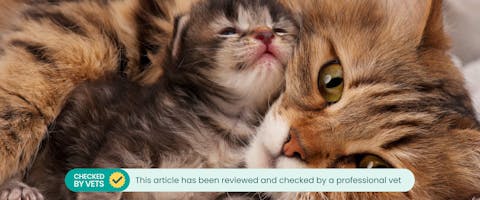Updated 02/09/2024
A queen expecting her first litter of kittens is an exciting moment for the whole family. But, being a pet parent to a soon-to-be-parent can raise a few questions and concerns about what’s ‘normal’. You want to make sure you’re as prepared as possible and know what to expect on the big day.
To help wash away your worries, we’ve pawed through the Internet to find out exactly what the average number of kittens in a first litter is, what can affect this number, and how else you can be the best pet parent to your pregnant feline friend.
Trending posts
Purr-use some of the top blogs our members have been loving this month- Top male dog names for your new furry friendGot a new furry family member in your pack? Check…

- Top female dog names for your new fluffy palWelcoming a new pooch into your family? Explore…

- 250+ gray cat names your silver feline will loveRecently welcomed a fluffy gray bundle of joy into…

- What are normal pet sitting rates?Discover the average pet sitting rates for animals…

- Unique dog names to stand out from the packDare to be different with our list of the best…

What is the average number of kittens in a first litter?
A cat or queen’s (as pregnant cats are known) weight, size, breed, age, and genetics will all determine how many kittens are usually in a litter. However, as an overall average of every type of domesticated cat, the average number of kittens in a first litter is between 4 and 6.
How many kittens are usually in a litter?
Cats can have as many kittens in a litter as 9 and as few as 1! Queens can have an average of 3 to 6 kittens per litter, so pretty much the average number of kittens in a first litter. But remember, there is no right or wrong number of babies! As long as the mom and her kittens are healthy and content, that’s all that matters.
What affects the size of a cat’s first litter of kittens?
There are lots of different natural and environmental reasons that can affect the size of a cat’s first litter of kittens. A cat’s genetics, breed, and size will all determine the number of kittens she’ll have. If you’re the proud parent of a pregnant Siamese, you can certainly expect more than the average number of kittens in a litter. But, if you’re caring for a Himalayan queen, they can have as few as 2 or even just 1 kitten.
A queen’s age will also determine the number of kittens in a litter - the older the queen, the fewer the kittens.
Environmental-wise, the more comfortable and well-fed a cat is, the more likely they are to carry more kittens. Of course, a happy and cared-for cat can still have only a couple of kittens as their first litter, but no harm can come from taking top care of your pregnant feline.
Can you tell how many babies will be in her first litter of kittens?
In truth, you’ll never know how many kittens are usually in a litter until they’re born. However, a veterinarian can perform diagnostic tests such as ultrasound and x-rays to determine the number of kittens you should be expecting. While not 100% accurate all of the time, these tests are usually an excellent guide in predicting numbers and risk factors such as the overall size of the kittens inside your cat.
When preparing for your cat’s first litter of kittens, make sure they have enough space for multiple kittens. When ‘B-Day’ arrives, make sure you contact your vet so they’re on standby if anything goes wrong or to make sure all the kittens have been safely delivered.
Caring tips for a pregnant cat expecting her first litter of kittens
Cat pregnancy can be nerve-wracking for any pet parent, especially when your cat is having her first litter of kittens. Be sure to keep the home calm and quiet and prepare an area for her to give birth in (this can be as simple as a cardboard box with blankets and soft towels). Make sure she has easy access to food, water, and a litter tray. Try to keep other pets out of your pregnant momma’s birthing space. Your pregnant cat will need lots of energy, so in the last third of her pregnancy, her energy requirements increase. Feeding kitten food is the easiest way for your cat to get the calories she needs to grow healthy kittens and feed them well after birth.
If you think your cat might be pregnant, take her to the vet for an ultrasound examination and health check. Together, you and your vet can discuss a birth plan for your queen and book at least one check-up closer to the birth date.
Meet our veterinary expert, Corinne
This article has been checked by veterinarian Corinne Wigfall BVMBVS(Hons) BVMedSci(Hons). Corinne is originally from Wales and moved to New Zealand after graduating university. She started her career with a university based equine internship and moved onto mixed and small animal practice. Currently she splits her time between online tele triage and working in an after hours vet clinic.
Connect with other cat carers and feline fans on our Community Forum to discuss all things about cat pregnancy and kitten care. Are you a pet parent looking for a cat sitter? Check out which of our pet-loving sitters are currently available near you in your area.

